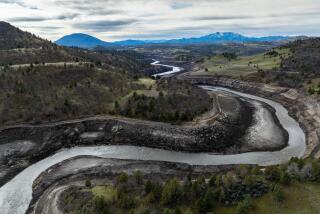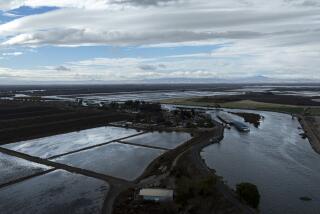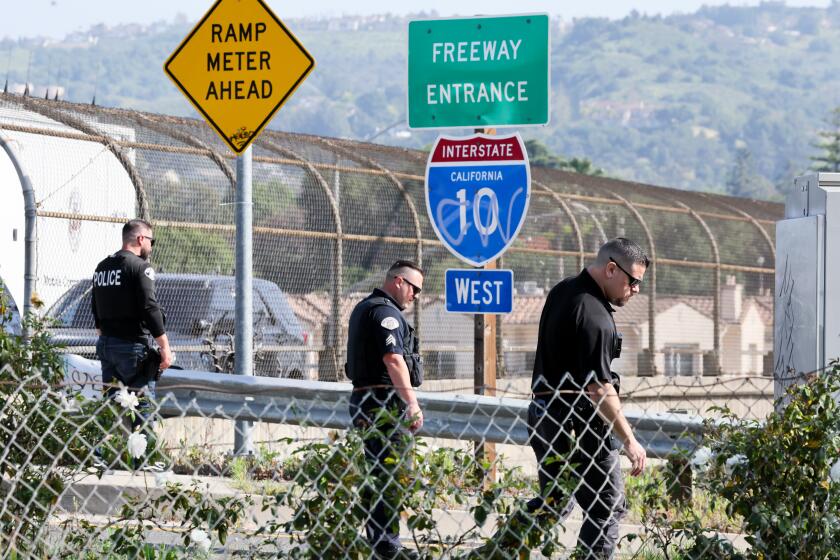Auburn Dam may really be dead this time
Use it or lose it is the rule of California water rights, and after 43 years, the would-be Auburn Dam -- subject of one of the state’s bitterest water feuds -- is about to lose it.
The proposed plug on the gold-sprinkled American River northeast of Sacramento has been declared dead many times since Congress authorized it in 1965, and there may be no reviving it now. The state is poised to take back the legal right it granted to the federal government to store water behind the dam. Without that right, the federal government cannot build a reservoir, and the state has never been inclined to build one itself.
“Auburn Dam” are fighting words in Northern California, pitting river rafters and other nature lovers against those who say that California’s thirst and the Sacramento area’s vulnerability to floods demand the trapping and storing of more Sierra snowmelt.
Money is at the heart of the fight. Dam opponents argue that the multibillion-dollar price of an Auburn Dam would outweigh its benefits, while backers say a dam would eventually pay for itself and save untold lives. The struggle has played out for decades in Congress and in the halls of Sacramento and Placer County governments.
The nation’s taxpayers have sunk $325 million into the project, with little to show beyond stacks of reports and a scarred canyon where construction was halted in 1975. So the state Water Resources Control Board is expected soon to finalize a draft decision to revoke the federal government’s rights.
At the same time, the Auburn Dam’s most powerful advocate prepares to retire from Congress. Republican Rep. John T. Doolittle of Roseville, who garnered tens of millions of federal dollars for study of a big dam at Auburn during his 18-year congressional career, decided this year not to run for reelection. He faces federal scrutiny of his ties to convicted lobbyist Jack Abramoff.
Doolittle will leave Congress in January. The race to replace him was so tight that elections officials aren’t sure yet whether the winner is Republican state Sen. Tom McClintock, who vows to keep pushing for a dam, or Democrat and Air Force veteran Charlie Brown, who opposes it.
If McClintock wins, his quest for construction of an Auburn Dam would face steep odds that would be even higher after a revocation of water rights. The project would have to be reauthorized by Congress, because costs have grown tremendously since 1965, and the agencies most likely to buy water and power from the dam project have shown little interest in sharing construction costs. And the federal government would have to apply anew for state water rights.
“You’ll never get the water rights back” once they are revoked, Doolittle said in a recent interview.
He predicted that an Auburn dam would be built some day, but not the kind he sought, with a big lake to provide water, electricity, recreation and flood control.
Sacramento will eventually require a dam to guard against floods, Doolittle said. But without water rights, the federal government would be limited to building a “dry” dam -- a concrete wall with a big hole in it to let the American River flow unimpeded most of the time and hold back water temporarily only in the event of a gigantic flood.
Dry dams were proposed by Sacramento flood-control officials twice in the 1990s but not funded by Congress.
“For heaven’s sake, we ought to be storing water,” said Doolittle. “We’re the ones who supply Southern California with their water.”
A dam at Auburn was long planned as part of the U.S. Bureau of Reclamation’s Central Valley Project, an audacious network of dams and canals that provides subsidized water to farmers from Redding to Bakersfield. But construction at Auburn stalled after an earthquake made federal engineers rethink the seismic safety of a thin-arch concrete dam.
Work was not resumed amid concerns about cost and the submersion of nearly 50 miles of river canyon.
Various incarnations of the dam have been touted by federal dam builders, valley farmers and Sacramento flood control officials for decades, all of them attacked by local river enthusiasts and national environmental groups.
Doolittle faulted “conniving environmentalists” for persuading the State Water Resources Board last month to revoke the Auburn Dam water rights under a state law that requires rights holders to exercise “due diligence” in putting their water to good use.
Last month, in the draft revocation order, the water board noted that the federal government was supposed to finish the dam by 1975 and put all the water to “beneficial use” by 2000.
“Reclamation has failed to meet these deadlines and subsequently failed to diligently pursue a request for an extension of time,” the board wrote. “Accordingly, cause for revocation exists.”
The water board rejected the federal argument that California should let Washington keep the water rights out of deference to Congress, which has not undone its 1965 dam authorization.
Still, dam backers do not concede defeat.
Earlier this month, 18 persistent members of the Auburn Dam Council met, as they do the first Monday of every month, at a Coco’s coffee shop in suburban Sacramento. Mostly white-haired retired engineers and water board directors, they resumed an ongoing discussion about winning over reluctant city and county officials to the merits of the dam.
“They should have this right on the wall in [Sacramento] City Hall,” said Joe Sullivan, who held up a newspaper graphic showing where hundreds of people perished in the 2005 Hurricane Katrina flooding of New Orleans.
After the meeting, Sullivan, president of the Sacramento County Taxpayers League, called the expected water rights revocation “temporarily the end.”
“They’ll build Auburn Dam,” he said, “right after Sacramento is flooded to 7 feet and people have died.”
And defenders of the North Fork of the American River are not claiming victory. They figure the fight will continue as long as inundation threatens Sacramento and Southern California needs water.
Ron Stork has argued against the dam for 21 years at the nonprofit group Friends of the River. The controversy, he said, “will never go away.”
Vogel is a Times staff writer.
More to Read
Start your day right
Sign up for Essential California for news, features and recommendations from the L.A. Times and beyond in your inbox six days a week.
You may occasionally receive promotional content from the Los Angeles Times.






